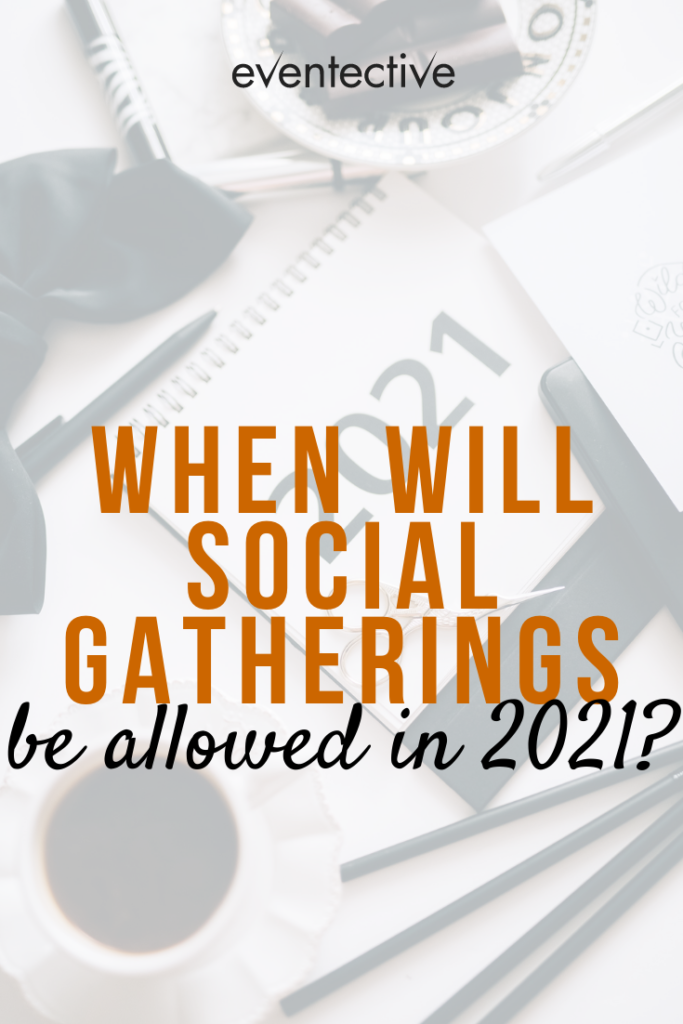
Recent COVID-19 news has many around the nation feeling hopeful for 2021. Since the beginning of the pandemic, we’ve all be asking When will things get back to normal? and What will that normal look like? Although the answers to those questions are still just predictions and not fact, the new year seems promising for social gatherings and event planning.
On December 10, the US Food and Drug Administration (FDA) Advisory Committee met to discuss the Pfizer vaccine candidate, and again on December 17, to do the same for the Moderna vaccine candidate. Both vaccines have received emergency use authorization (EUA), which grants permission to use unapproved medical products to treat life-threatening diseases. In other words, the FDA has granted temporary, emergency use of these vaccines to help prevent the spread of COVID-19. Both companies began distributing vaccines before the end of 2020.
What the Experts Say

Of course, everyone can’t be vaccinated at once. And both vaccine candidates require two doses a few weeks apart. So life won’t be totally normal as of January 1—instead, the vaccine will roll out in large numbers over the course of 2021. Once enough people are vaccinated, restrictions on social gatherings will begin being lifted.
But what does that timeline look like—really? And how does that impact your 2021 events? Well, the good news is that all of the experts have roughly the same predictions. Below, we’ve laid out a timeline based on the predictions of three experts:
- Caitlin Rivers, a Johns Hopkins epidemiologist (source: New York Times)
- Anthony Fauci, MD, the nation’s top infectious disease expert (source: Association of American Medical Colleges)
- Moncef Slaoui, the head of the US government’s effort to develop a vaccine (source: CNN)
Of course, these predictions are based on current data, which is subject to change as the vaccine rolls out. But they’re an excellent starting point for planning the new year, choosing event dates, and curating your guest list.
December 2020 – January 2021

With FDA approval of the EUAs, Pfizer and Moderna began distributing vaccines at the end of December 2020. The first wave goes to those who need it the most: healthcare workers and those living in long-term-care facilities. Healthcare workers have a greater risk of being exposed to the virus, as they are treating patients who are actively infected. Similarly, those living in long-term-care facilities are also at an increased risk, for two reasons. Firstly, because many residents are elderly, which makes them vulnerable to the virus. And secondly, because a virus of any kind spreads quickly in closed residences, like nursing homes.
February – March 2021
The second wave of vaccines will likely come towards the end of winter or the beginning of spring. This batch of vaccines will be distributed to other high-risk populations, like those who are 65 or older (not living in long-term-care facilities), those with medical conditions that make them more vulnerable to the virus, and essential workers. Essential worker is defined differently in different states, but common examples include educators and law enforcement.
April – June 2021

During the end of spring and beginning of summer, the experts estimate that the vaccine will be distributed to the rest of the population. As we approach this stage, there may still be a priority list of recipients, but we’ll know more as the year progresses. To date, there hasn’t been any instructions or officially published timeline from either manufacturer, so we’ll have to be patient for just a little bit longer!
August – December 2021
By the end of 2021, many experts are predicting a return to mostly normal. The specific timeline varies slightly from expert to expert, but they are all predicting a positive end to the new year. Specifically, Caitlin Rivers predicts that social gatherings will be largely safe by the summertime, and Moncef Slaoui predicts an even more generous return to normalcy as early as May. He does explain, though, that that depends on enough residents receiving the vaccine for it to be effective. And while Anthony Fauci doesn’t disagree, his estimation of the third and fourth quarters of 2021 is slightly more conservative than the others. All in all, current projections for the end of 2021 look promising!
What This Means for Event Planners
We can’t stress it enough—life won’t be totally normal in 2021. There may still be some restrictions, even towards the end, on very large gatherings. However, we’ll know of any continued restrictions on social gatherings as the year progresses. So it’s OK to plan ahead; just make sure you’re always following local and national guidelines for any event.

As you plan new events or reschedule old ones, choose a date at the very end of 2021 or in early 2022 to reduce the risk of canceling (again!). We don’t have to tell you how hard it can be to reschedule an event! Also keep your guest list in mind. Will they be comfortable attending an event? What safety protocols can you implement to keep everyone at ease? You may still choose a shorter guest list for the guests’ sake. And that’s OK! This will be a new normal, and we all need time to adjust.
What This Means for Event Professionals
While planners may choose to avoid very large social gatherings in 2021, things are still looking up for the event industry. As 2021 progresses, you will likely see an increase in bookings and requests for more information. Everyone is going to be excited to finally celebrate their wedding and throw a birthday party! To prepare for the influx of events, we recommend doing a few things.
First off, in-person tours will still be limited for the first half of 2021. But planners will still want to see your venue! So get ready to host virtual tours of your facility or schedule video calls to discuss your skill set. Secondly, dust off your website and join an online event directory. Planners won’t be sure who’s still open in the new year, so they’ll turn to places like Eventective to showcase the best of the best for 2021. And finally, consider being available during “off” days or “off” times. For example, consider mid-week wedding ceremonies or being available to DJ on a Tuesday. That way, you can book more events as soon as you’re able to.
Conclusion

Remember that a vaccine doesn’t mean COVID-19 won’t exist anymore. But it will significantly reduce the spread and the risk. While social gatherings may be possible in the second half of 2021, it’s important to maintain proper safety measures until then. Follow local and national guidelines, and keep physical distance between you, your guests, and your customers. We’re almost there—the end is in sight! Let’s keep planning those events a little farther out to be safe, and eagerly await the day when we can all gather together again.

